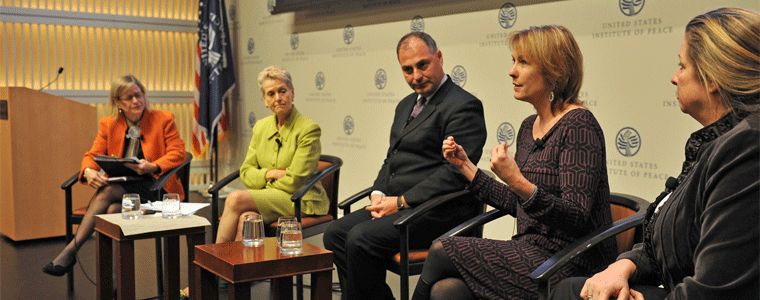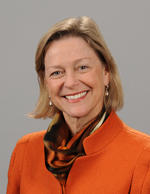Gender and Peacebuilding Center Director, Kathleen Kuehnast, discusses USIP's focus on women's equality in 2011 and looks ahead at the gender projects USIP will work on in 2012.

 Gender and Peacebuilding Center Director, Kathleen Kuehnast, discusses USIP's focus on women's equality in 2011 and looks ahead at the gender projects USIP will work on in 2012.
Gender and Peacebuilding Center Director, Kathleen Kuehnast, discusses USIP's focus on women's equality in 2011 and looks ahead at the gender projects USIP will work on in 2012.
What are some highlights of advancements in gender and peacebuilding in 2011?
The U.S. Civil Society Working Group on the U.S. National Action Plan for Women, Peace and Security was established and convened. This working group, encompassing more than 20 civil society organizations, met on a biweekly basis at USIP to support U.S. government representatives in the development of the U.S. National Action Plan (NAP) for Women, Peace and Security. In addition, USIP attended consultations with U.S. representatives as the U.S. NAP was developed.
- Partnered with the U.S. Civil Society Working Group to write a memorandum regarding “Guidance for the U.S. National Action Plan on Women, Peace and Security” (Issued February 15, 2010);
- Partnered with the U.S. Civil Society Working Group to write the “U.S. Civil Society Expert Statement on the U.S. National Action Plan for Women, Peace and Security” (Issued November 28, 2011).
USIP’s Gender and Peacebuilding Center hosted the Women and War Series which included:
- “Women and War: Power and Protection” hosted 1,097 participants, featured 55 panelists, and ten partner organizations (November 3 -5, 2010);
- “Women and War Book Launch and Symposium” hosted 739 participants, featured 20 panelists, and partnered with the Royal Norwegian Embassy and PRIO (May 5-6, 2011);
- “Women and War Series: Liberian Women Peacekeepers” hosted 128 participants, featured four panelists and the documentary “Pray the Devil Back to Hell,” and partnered with Fork Films and the Office of Congressman Russ Carnahan (September 13, 2011);
- “Women and War Series: Peace Unveiled in Afghanistan” hosted 223 participants, featured four panelists and the documentary “Peace Unveiled,” and partnered with Fork Films and the Office of Congressman Carnahan (October 5, 2011);
- “Women and War Series – Global Security: Through a Bosnian Lens” hosted 247 participants, featured six panelists and the documentary “I Came to Testify,” and partnered with the Institute for Inclusive Security, U.S. Agency for International Development, and Fork Films (October 25, 2011).
Established the Working Group on Best Practices and Lessons Learned in Afghan and Iraqi Women’s Programming. This working group consists of representatives of the U.S. government (USG), international nongovernmental organizations (NGOs), and the Allied Embassies, along with key members of Congress and their staff and members of the U.S. Armed Forces. Six working group discussions have been held to date with participants from more than 30 organizations representing congressional offices, government agencies, U.S. military and civil society.
From these meetings USIP’s Gender and Peacebuilding Center developed a comprehensive report on best practices in Afghan and Iraqi women’s programming, which ultimately has set the stage for a lessons learned global exchange with Afghan and Iraqi women leaders in spring 2012.
What will the Gender and Peacebuilding Center focus on in 2012? What are some goals for this year?
Educating Peacebuilders at Home and Abroad – Development of a Gender and Peacebuilding Course for Peace Support Operations
- In partnership with the Naval Warfare Development Command (NWDC-Norfolk, VA), Fork Films (NYC), International Civil Society Action Network (ICAN), and the U.S. Army John F. Kennedy Special Warfare Center and School in Fort Bragg, NC, USIP’s Gender and Peacebuilding Center will develop a Gender and Peacebuilding Course for Peace Support Operations to strengthen technical, civil and military institutional capacities to mainstream gender and women’s issues in training for peace support operations.
Women Establish Themselves in the Security Field – Afghan and Iraqi Women’s Leadership and Learning Exchange
- USIP’s Gender and Peacebuilding Center will host the Spring 2012 Afghan and Iraqi Women’s Leadership and Learning Exchange to engage and support women leaders in model peacebuilding and conflict resolution programs from other post-conflict contexts, particularly Iraq, where a high participation of women is a key feature; facilitate consensus building dialogues among key women leaders in Afghanistan not only in parliament, but also among provincial and rural leaders, including civil society leaders; and build upon these two efforts in order to develop a conflict analysis framework that will better inform gender analysis of peacebuilding efforts and its impact on Afghan women.
Stimulating the Exchange of Ideas: USIP as Intellectual Catalyst – The Missing Peace: Sexual Violence in Conflict and Post-Conflict Settings
- The United States Institute of Peace (USIP), the Human Rights Center at the University of California, Berkeley, the Peace Research Institute Oslo (PRIO), and Stockholm International Peace Research Institute-North America (SIPRI-North America) will convene a group of scholars, policymakers, practitioners, and military and civil society actors to examine the issue of sexual violence in conflict and post-conflict settings, identify gaps in knowledge and reporting and explore how to increase the effectiveness of current responses to sexual and gender-based violence. Using technology such as Twitter, live blogging and webcasting, the hosts will actively engage interested parties globally who cannot attend the event in person. Remote viewing hubs will be set up by partner organizations in venues such as Bosnia, Colombia, the Democratic Republic of Congo, Egypt, Kenya, Peru, Sri Lanka, Uganda and Vietnam.